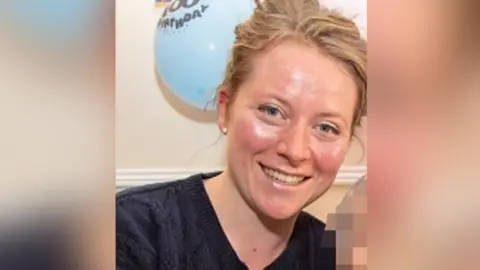Headless body murder trial jury can consider manslaughter charge
 Devon and Cornwall Police
Devon and Cornwall PoliceJurors can consider if a woman cut off her friend's head and disposed of her body, but had not intended to kill her.
Jemma Mitchell is accused of murdering Mee Kuen Chong at her home in Wembley, north-west London, on 11 June 2021 before removing her body in a suitcase.
The 38-year-old allegedly then dumped Ms Chong's headless corpse more than 200 miles (322km) away in woodland near Salcombe, Devon, 15 days later.
Judge Richard Marks said jurors could consider a charge of manslaughter.
Ms Mitchell has denied murdering Ms Chong, 64, who was known as Deborah, but declined to give evidence in her defence.
The prosecution claims the defendant was motivated by money and had faked Ms Chong's will to pay for repairs to her dilapidated home in Willesden.
 Jonathan Goldberg
Jonathan GoldbergOn Friday, Judge Richard Marks, said it was "not the case for either the prosecution or the defence that the defendant is guilty of manslaughter as opposed to murder".
He continued: "The prosecution say this is a case of premeditated murder and that is the reason why the defendant took the suitcase with her to the house on 11 June - i.e. for the purpose of removing the body.
"The defence on the other hand say that the prosecution have failed to prove that Deborah Chong was unlawfully killed and then, even if you conclude that she was, they have failed to prove that she was unlawfully killed by the defendant."
The judge added it was a circumstantial case with no witnesses and that while jurors could consider Ms Mitchell had told various lies, they should not assume they meant she "must be guilty".
Examples given during the trial allegedly included providing a false name and address to a taxi firm and lying about how she injured her finger on 11 June last year.
Judge Marks explained that defendants sometimes told lies out of "panic or fear or because they think that their genuine explanation may not be believed".
On Ms Mitchell's failure to not go into the witness box, he said: "You must not jump to the conclusion that her silence proved the case against her. It does not."
But he added: "It is open to you to conclude that the reason why the defendant remained silent is that in truth that she had no answer to the prosecution case or none that she thought would stand up in cross-examination."
The trial at the Old Bailey was adjourned until Monday.

Follow BBC London on Facebook, Twitter and Instagram. Send your story ideas to [email protected]
